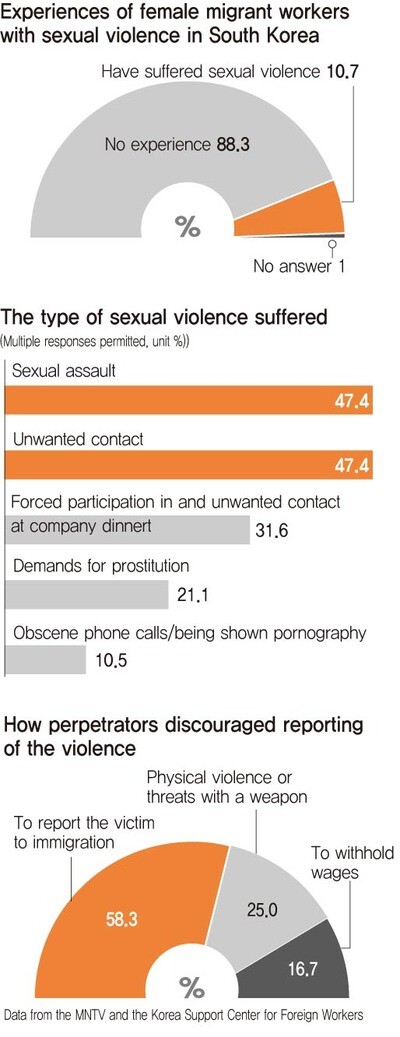hankyoreh
Links to other country sites 다른 나라 사이트 링크
More than 1 in 10 female migrants suffers sexual abuse

By Um Ji-won, staff reporter
When “Bopha” arrived in South Korea last year, it was the country of her dreams. It took just two days after the 20-something Cambodian woman’s arrival at a South Gyeongsang farm for it to turn into a nightmare. The owner organized a dinner party and told Bopha, who was unfamiliar with Korean food, to “go wait in the car.” Soon he came to her and told her to strip. She refused, but he persisted. Early the next morning, he came to her dormitory, where she was sleeping, and told her she had to sleep with him. She escaped the immediate threat with the help of co-workers, but she could no longer stay at the farm. She eventually moved to a shelter for migrant women.
For female migrant workers, who account for around 1% of all South Korean workers, their status as both female and foreign exposes them to the worst human rights violation of all: sexual assault.
According to Statistics Korea, there were 274,000 female migrant workers in South Korea in 2012, representing 34.6% of the 791,000 foreign workers and about 1% of South Korea’s 25 million total workers.
Research findings released on Apr. 29 by the migrant workers’ online network MNTV and the Korea Support Center for Foreign Workers (KSCFW) paint a grim picture. According to a March survey of 1,218 migrant workers who entered the country through the Employment Permit System (EPS), 10.7% of the 205 female workers who responded said they had experienced sexual assault or harassment. When asked what form of abuse they had experienced, 47.4% reported sexual assault, 31.6% unwanted physical contact at a company dinner, and 21.1% demands for prostitution. The culprits were most often bosses (reported by 80%) or managers (70%).
Of the women who experienced sexual abuse, 68.2% said they did not report it. Their unstable job status is the main reason. Not only would their narrowly defined position as migrant workers be jeopardized by revelations of sexual abuse, but the terms of the EPS prevent them for requesting a change of workplace. Male bosses take full advantage of this. Over half of the victimized women - 58.3% - said their assailant had threatened to report them to immigration authorities prior to the assault, and 16% said he had threatened to withhold wages.
Adding to the insecurity is the fact that the bosses may not suffer any real punishment even if the assault is reported. In October 2012, the Nonsan branch of Daejeon District Court found a 43-year-old business owner named Jeon not guilty of sexual assault and illegal confinement against a 35-year-old Chinese worker. Prosecutors had asked for a seven-year sentence, saying Jeon had assaulted or harassed the employee on at least seven occasions. But the court called her testimony “unreliable” and said there was no evidence to support her claims.
Another problem is the shortage of organizations that provide counseling and protection specifically for female migrant workers. As of 2010, there were five facilities for sexual assault victims that offered support for migrant workers. Private organizations, and even KSCFW, the largest recipient of Ministry of Employment and Labor funding, do not have guidelines for sexual violence.
Han Kuk-yeom, president of the Women Migrants Human Rights Center of Korea, said most of the workers keep quiet about their abuse.
“They struggled to come to Korea and earn money, and even if they can prove sexual abuse by their employers, they know they can only stay until it’s been confirmed, and then they have to return home once the case is closed,” Han explained.
Han said the law should be changed so that victims receive legally guaranteed financial compensation and EPS benefits even if they are illegal residents.
Please direct questions or comments to [english@hani.co.kr]

Editorial・opinion
![[Editorial] Does Yoon think the Korean public is wrong? [Editorial] Does Yoon think the Korean public is wrong?](https://flexible.img.hani.co.kr/flexible/normal/500/300/imgdb/original/2024/0417/8517133419684774.jpg) [Editorial] Does Yoon think the Korean public is wrong?
[Editorial] Does Yoon think the Korean public is wrong?![[Editorial] As it bolsters its alliance with US, Japan must be accountable for past [Editorial] As it bolsters its alliance with US, Japan must be accountable for past](https://flexible.img.hani.co.kr/flexible/normal/500/300/imgdb/original/2024/0417/6817133413968321.jpg) [Editorial] As it bolsters its alliance with US, Japan must be accountable for past
[Editorial] As it bolsters its alliance with US, Japan must be accountable for past- [Guest essay] Amending the Constitution is Yoon’s key to leaving office in public’s good graces
- [Editorial] 10 years on, lessons of Sewol tragedy must never be forgotten
- [Column] A death blow to Korea’s prosecutor politics
- [Correspondent’s column] The US and the end of Japanese pacifism
- [Guest essay] How Korea turned its trainee doctors into monsters
- [Guest essay] As someone who helped forge Seoul-Moscow ties, their status today troubles me
- [Editorial] Koreans sent a loud and clear message to Yoon
- [Column] In Korea’s midterm elections, it’s time for accountability
Most viewed articles
- 1[Column] The clock is ticking for Korea’s first lady
- 2Samsung barricades office as unionized workers strike for better conditions
- 3[Editorial] When the choice is kids or career, Korea will never overcome birth rate woes
- 4[Editorial] As it bolsters its alliance with US, Japan must be accountable for past
- 5S. Korea, Japan reaffirm commitment to strengthening trilateral ties with US
- 6[Guest essay] How Korea turned its trainee doctors into monsters
- 7Japan officially says compensation of Korean forced laborers isn’t its responsibility
- 8Why Israel isn’t hitting Iran with immediate retaliation
- 9Worse than worst case: Korea’s population is shrinking faster than predicted
- 10[News analysis] After elections, prosecutorial reform will likely make legislative agenda